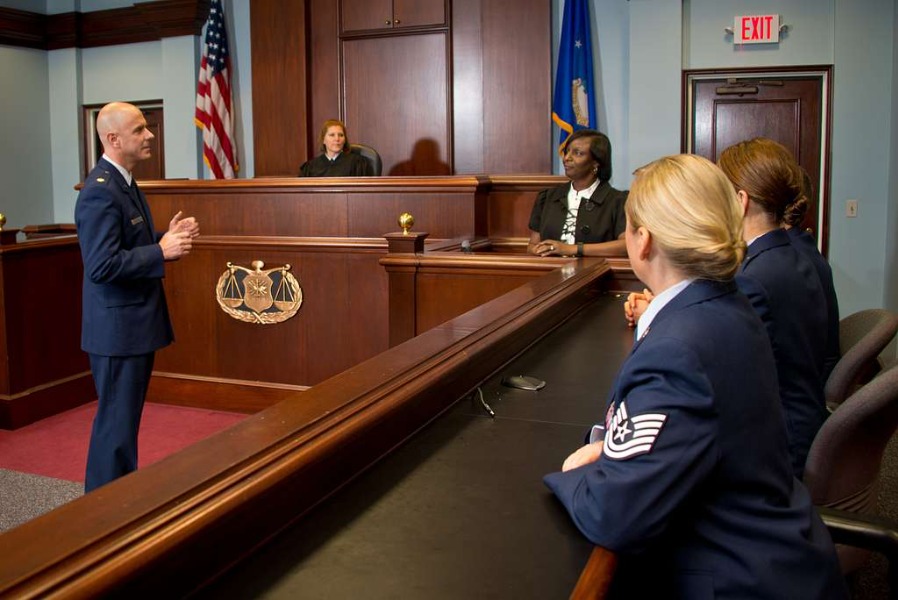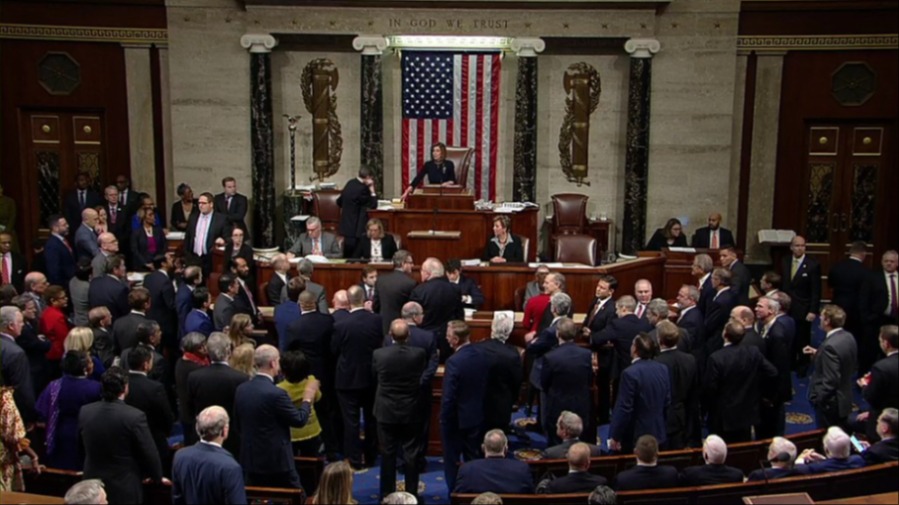What’s Happening in the Litigation Over Matthew Whitaker’s Appointment?
One month to the day since Attorney General Jeff Sessions left the Justice Department, President Trump indicated to reporters that he will nominate former Attorney General William Barr to serve as Session’s replacement.
Published by The Lawfare Institute
in Cooperation With

One month to the day since Attorney General Jeff Sessions left the Justice Department, President Trump indicated to reporters that he will nominate former Attorney General William Barr to serve as Session’s replacement. Acting Attorney General Matthew Whitaker—who, Trump has said, is “doing a really great job”—will remain in his position pending Barr’s confirmation.
Despite his short tenure, Whitaker’s role generated a wide array of legal action as numerous parties challenged the validity of his appointment. Critics of Trump’s decision claim that the president violated the Appointments Clause of the Constitution when he did not seek Senate approval for Whitaker to temporarily fill the role of attorney general. Others have argued that Deputy Attorney General Rod Rosenstein is properly the acting attorney general pursuant to 28 U.S.C. § 508, the Attorney General Succession Act.
Over Whitaker’s time leading the Justice Department, I have been tracking ten ongoing cases related to his appointment. Now that Whitaker’s role as acting attorney general has an end date, the legal questions raised by his appointment will be further complicated to some unknown degree. While some of these cases may be resolved as moot, others may transform over the coming months as Whitaker remains acting attorney general throughout Barr’s confirmation process. Given Barr’s credentials, his confirmation is likely to be successful—but an individual facing numerous legal challenges to his appointment will likely remain the head of the Justice Department until January or February at the earliest.
Regardless of how these cases eventually play out, the legal confusion generated by Whitaker’s appointment remains for the moment—though it has flown under the radar in the weeks since Whitaker took over as head of the Justice Department. The government has had to devote time and energy to responding to the implications of Whitaker’s appointment in a wide range of cases. The cases themselves raise a number of interesting questions, and they are worth examining in greater depth regardless of how Whitaker’s situation proceeds in the coming weeks.
There are six cases currently at the district court level, four of which arose from matters unrelated to the Whitaker appointment. In these cases, the plaintiffs incorporated challenges to Whitaker’s appointment into ongoing litigation. In Maryland v. U.S., litigation over the administration’s handling of the Affordable Care Act, the plaintiffs seek a preliminary injunction preventing the case from proceeding with Whitaker appearing as acting attorney general, and to substitute Rosenstein for Sessions as a defendant. In O.A. v. Trump, the plaintiffs are challenging the validity of the recently-issued Justice Department and Department of Homeland Security rule limiting who may seek asylum in the United States, as it was issued under Whitaker’s authority. The defendants in U.S. v. Valencia filed a motion to dismiss the criminal case against them—involving alleged theft of oil from Texas energy companies—based on Whitaker’s lack of authority to prosecute. And the defendants in U.S. v. Haning, a wire fraud prosecution, filed a motion to dismiss the indictment or disqualify the prosecution on the grounds that the three attorneys prosecuting the case are “special attorneys” deriving their authority directly from the attorney general.
Of the remaining two district court cases, Rojo-Ramirez v. Trump involves a Colorado resident who filed a complaint on Dec. 4 arguing that U.S. immigration judges are temporarily without authority given they are appointed by the attorney general. And in Blumenthal v. Whitaker, Democratic Sens. Richard Blumenthal, Sheldon Whitehouse and Mazie Hirono brought a suit against both Whitaker and Trump arguing that the Senate was unconstitutionally denied the opportunity to vote on Whitaker’s appointment.
At the appellate level, Alsomairi v. Dawson concerns a challenge to a 1996 deportation order. Second is the ongoing legal battle between Roger Stone associate Andrew Miller and Special Counsel Robert Mueller. Miller’s motion attacking Whitaker’s appointment is his latest effort to resist grand jury subpoenas.
The parties in Michaels v. Whitaker are waiting to hear on their petition for a writ of certiorari from the Supreme Court. The case initially concerned whether felons can be denied the right to purchase firearms; however, nine days after Sessions resigned the plaintiffs filed a motion to substitute that included a challenge to Whitaker’s appointment.
The final case is before Whitaker himself. On Oct. 18, Jeff Sessions directed the Board of Immigration Appeals to refer an immigration case to him in his role as attorney general. The American Immigration Council filed an amicus brief on Dec. 3 claiming that Whitaker is unable to preside over this case given his “unlawful” designation.
Of these cases, there have been interesting developments in a few. Most substantively, the government has filed motions in five cases (Maryland v. U.S., Michaels v. Whitaker, Miller v. U.S., U.S. v. Valencia, and U.S. v. Haning) laying out its arguments in defense of Whitaker’s appointment. The content of these arguments is essentially identical across the various cases. In fact, defense counsel in Haning accused the Justice Department of “effectively copying and pasting [its] response” to the challenge to Whitaker’s appointment from one case to another.
As a statutory matter, the government contends that Trump’s decision was valid “pursuant to the President’s well-settled authority under the Federal Vacancies Reform Act” (FVRA). Under the FVRA, if an officer of an executive agency “dies, resigns, or is otherwise unable to perform the functions and duties of the office” then the president has three options for the officer’s replacement:
(1) the first assistant to the office of such officer shall perform the functions and duties of the office temporarily in an acting capacity.
(2) notwithstanding paragraph (1), the President (and only the President) may direct a person who serves in an office for which appointment is required to be made by the President, by and with the advice and consent of the Senate, to perform the functions and duties of the vacant office temporarily in an acting capacity .
(3) notwithstanding paragraph (1), the President (and only the President) may direct an officer or employee of such Executive agency to perform the functions and duties of the vacant office temporarily in an acting capacity.
The government contends that the president acted lawfully on his authority under the third option, given that Whitaker’s service as Sessions’s chief of staff fulfills the statutory requirements of 5 USC § 3345(a)(3), and that Whitaker’s selection was not precluded by 28 U.S.C. § 508, which states that “the Deputy Attorney General may exercise all the duties” of the attorney general if the latter office is vacant.
On constitutional grounds, the Justice Department argues that Whitaker’s appointment did not violate the Appointments Clause because the acting attorney general is not a principal officer of the United States. Principal officers must be nominated by the president and confirmed by the Senate under the Appointments Clause, while inferior officers need not be. Across court documents, the Justice Department cites United States v. Eaton, a 1898 case in which the Supreme Court found that “an inferior officer may perform the duties of a principal officer ‘for a limited time[] and under special and temporary conditions’ without ‘transform[ing]’ his office into one for which Senate confirmation is required.” Under Eaton, the government argues, Whitaker is an inferior officer and his appointment is appropriate without Senate confirmation. Notably, the Justice Department nevertheless maintains, “There is no question that Senate confirmation is an important constitutional check.”
The Trump administration has so far articulated some variation of this argument in five of the ongoing cases. Only in one case, U.S. v. Haning, has the defendant responded to the government’s formal position. Haning’s counsel underscored the historic significance of Whitaker’s appointment, arguing that, “for the first time in history, the President has circumvented that structural system of checks and balances by forcing the resignation of an Attorney General and appointing his replacement without submitting his name to the Senate for confirmation.” Directly criticizing the government’s reliance on United States v. Eaton as precedent, the defendant argued that the situation in that case was “far from the Constitutional crisis facing the Nation today.” The principal officer at issue in Eaton was “vice-consul to Siam”—a relatively low-level position—who grew “gravely ill, leaving no Senate-confirmed official behind.” Whitaker, on the other hand, “holds one of the most important and powerful positions in the world.”
So far, most courts have not yet ruled on the question of Whitaker’s appointment. On Nov. 28, the U.S. Court of Appeals for the Second Circuit, in Alsomairi, denied the plaintiff’s motion regarding Whitaker as moot after dismissing his appeal on unrelated grounds.
In Valencia v. United States, however, the court tackled Whitaker’s appointment head-on. On Nov. 27, Judge David Alan Ezra of the U.S. District Court for the Western District of Texas denied the defendants’ motion to dismiss the indictment against them due to Whitaker’s lack of authority. In a 20-page order, Judge Ezra agreed with all four elements of the government’s argument and held that:
(1) Whitaker’s appointment is valid under the Federal Vacancies Reform Act (”FVRA”); (2) even if it is an invalid appointment under the Attorney General Succession Act (“AGSA”), there is still an Acting Attorney General with the authority to continue this prosecution; (3) the appointment is constitutional under the Appointments Clause of the Constitution of the United States; and (4) regardless of any statutory or constitutional problems with the appointment, the United States Attorney for the Western District of Texas has the authority to continue this prosecution.
On the second point, Judge Ezra wrote that, even if Whitaker is not lawfully the acting attorney general, by the defendants’ own argument Deputy Attorney General Rod Rosenstein would be acting attorney general under 28 U.S.C. § 508—and Rosenstein would have the authority to oversee the defendants’ prosecution.
Judge Ezra sided with the government on one final issue worth noting—and while his decision is not surprising, it could well have caused Justice Department officials to breathe a sigh of relief. The defendants argued in their motion to dismiss the case that “the Department of Justice and all of its subordinate officers lack the constitutional authority to act” given that those subordinates derive their authority from the attorney general himself. David Kris articulated a similar concern in the weeks immediately following Whitaker’s appointment. Writing for Lawfare, Kris explained:
There is a general rule that ..., “actions taken in violation of the FVRA are void ab initio”—meaning that they “shall have no force and effect” and “may not be ratified” after the fact … If a reviewing court finds Whitaker’s appointment improper and takes that approach to the scope of the remedy, the Justice Department may be in big trouble.
Kris noted that this drastic decision could be forestalled by the independent grants of authority to various officials within the Justice Department, including U.S. attorneys, who may “prosecute for all offenses against the United States” under 28 USC § 547(1), though under the attorney general’s control. Judge Ezra took this view and called the defendants’ argument on this issue “misplaced.” The judge wrote that the authority that the U.S. attorney for the Western District of Texas has to prosecute the case under § 547(1) “is not affected by the designation of the Acting Attorney General.”
Judge Ezra disagreed with the government on one key, if hypothetical, issue: would President Trump have been able to appoint Whitaker under the FVRA if Sessions were fired, rather than resigned? This is an important question because Sessions wrote that he was submitting his resignation letter to the president “at your request”—seemingly acknowledging Trump forced Sessions out. The language of the FVRA specifies that the president may appoint a replacement if the officer “dies, resigns, or is otherwise unable to perform the functions and duties of the office,” but it is not clear whether being fired delegates an individual “unable to perform” their official role. In a Notice filed on Dec. 3 in Maryland v. U.S., the government claims that Sessions “submitted his resignation ‘[a]t [the President’s] request,” an action that still constitutes a resignation under the language of section 3345(a). However, the government argued in the same filing that even if Sessions were fired, “he still would have been rendered ‘otherwise unable to perform the functions and duties of the office,’” and Trump would have been able to appoint Whitaker his replacement. Judge Ezra disputes this interpretation: although the FVRA does not differentiate between voluntary and involuntary resignation, he claims the statute would nevertheless be “inapplicable” if the president had fired Sessions.
Judge Ezra also wrote that Whitaker’s appointment could be challenged in the future if the president were to “make a statement that implies Whitaker’s appointment is permanent” and suggested that, at some point during the 210-day period Whitaker is allowed to serve as acting attorney general under the FVRA, his appointment might “shift[] … into one requiring Senate confirmation.” Notably, the judge turned to Trump’s Twitter account to gauge how long Whitaker had served in the role: “As there has been no official order, all the Court can examine regarding the length of the appointment or designation are the President’s tweets.”
Judge Ezra explicitly refused to “engage in speculation as to if and when the President will nominate a permanent Attorney General.” That may be a wise approach given the uncertainty of the present moment—even after Barr’s nomination. As President Trump articulated on a Thanksgiving day phone call, “Matt Whitaker is a highly respected person... [But] once I choose somebody, they always go through hell.”





